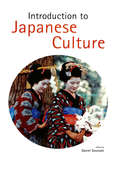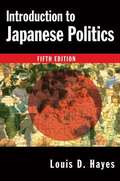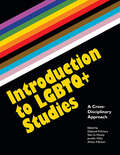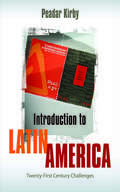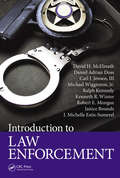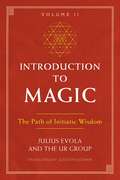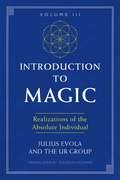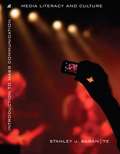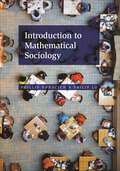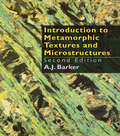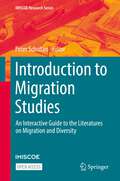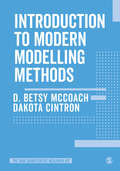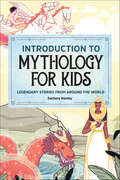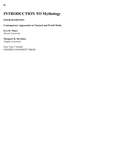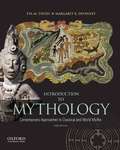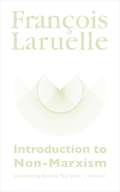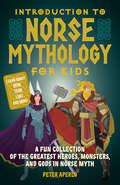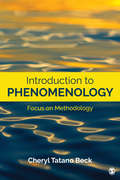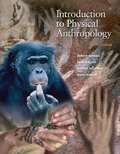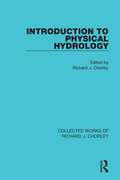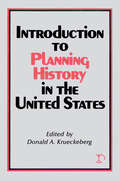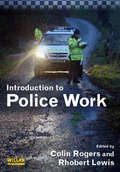- Table View
- List View
Introduction to Japanese Culture
by Daniel SosnoskiFeaturing full-color photographs and illustrations throughout this text is a comprehensive guide to Japanese culture.The richness of Japan's history is renowned worldwide. The heritage of culture that its society has produced and passed on to future generations is one of Japan's greatest accomplishments. In Introduction to Japanese Culture, you'll read an overview, through sixty-eight original and informative essays, of Japan's most notable cultural achievements, including:Religion, Zen Buddhism, arranged marriages and BushidoDrama and Art-from pottery, painting and calligraphy to haiku, kabuki and karateCuisine-everything from rice to raw fishHome and Recreation, from board games such as Go to origami, kimonos and Japanese gardensThe Japan of today is a fully modern, Westernized society in nearly every regard. Even so, the elements of an earlier age are clearly visible in the country's arts, festivals, and customs. This book focuses on the essential constants that remain in present-day Japan and their counterparts in Western culture.Edited by Daniel Sosnoski, these well-researched articles, color photographs, and line illustrations provide a compact guide to aspects of Japan that often puzzle the outside observer. Introduction to Japanese Culture is wonderfully informative, a needed primer on the cultural make-up and behaviors of the Japanese.
Introduction to Japanese Politics
by Louis D. HayesThis classic introduction to the Japanese political system has been revised and updated to take the account of a time of turmoil in the country's political life. It incorporates new coverage of the end of the Koizumi era, the brief and troubled premiership of Abe, and the selection of Fukuda as prime minister. This edition also includes expanded material on "bubble" and "post-bubble" economic developments, as well as all-new coverage of health care policy.The text opens with an overview of Japan's geographical setting and history. The next group of chapters covers political institutions, processes, and actors. Two sections then address the country's distinctive social order and economy, educational, healthcare, and public safety systems. Part five looks at the increasingly contentious realm of foreign relations and security issues, including China's expanding role and the issue of North Korea. A concluding section considers dynamics of change in Japanese politics.
Introduction to LGBTQ+ Studies: A Cross-Disciplinary Approach (Open Educational Resources)
by Deborah P. Amory; Sean G. Massey; Jennifer Miller; Allison P. BrownIntroduction to LGBTQ+ Studies offers accessible, academically sound information on a wide range of topics, including history, culture, and Queer Theory; an exploration of LGBTQ+ relationships, families, parenting, health, and education; and how to conduct research on LGBTQ+ topics. The book explores LGBTQ+ issues from the ancient world to contemporary global perspectives.Employing an intersectional analysis, the textbook highlights how sexuality and gender are simultaneously experienced and constructed through other structures of inequality and privilege, such as race and class. The text supports multiple learning styles by integrating visual elements, multimedia resources, discussion and project prompts, and resources for further research throughout the textbook.An OER version of this course is freely available thanks to the generous support of SUNY OER Services. Access the book online at https://milneopentextbooks.org/introduction-to-lgbtq-studies-a-cross-disciplinary-approach/.
Introduction to Latin America: Twenty-First Century Challenges
by Peadar Kirby`This excellent textbook provides students of Latin America with a rich and deep analysis of the processes and outcomes of globalization, past and present. Diversity and difference are explored using vivid and detailed country profiles. A strength of this textbook is its ability to explain complex issues in a way that is engaging and informative. It provides conceptual frameworks for students to engage in independent analysis of the complexities of global forces as they impact on, and interact with, the "local" in different contexts. It also, however, engages with the issues of crucial importance for the lived realities of Latin American people- poverty, development, the state and resistance under changing political, economic and ideological conditions. An essential buy for serious students of Latin America' - Anne Boran, Chester College, University of Liverpool `This is an outstanding textbook which will appeal to a wide audience but especially those wishing to understand contemporary Latin America.... I have been studying Latin America for over 40 years and wish I could have written such a lucid and engaging book' - Dr Crist[ac]obal Kay, Institute of Social Studies, The Hague Introduction to Latin America provides a completely new introduction to the political, social and economic forces shaping this essential region of undergraduate study today. It is the first textbook to place Latin America within a genuinely global context and introduce the debates and impact of globalization, neoliberalism, democratization, and the environment. It fully reviews the traditional literature in the postwar period (such as modernization or dependency theory) to demonstrate the way in which Latin America has often been misunderstood and introduces more recent theorizing to consider the longer-term prospects for equitable and sustainable development. Encorporating maps, case study boxes, summary exhibits, and guides to further reading, Introduction to Latin America will be an essential text for all students of Latin America across politics, international studies, geography, sociology and development studies.
Introduction to Law Enforcement
by David H. McElreath Daniel Adrian Doss Carl J. Jensen III Michael Wigginton Jr. Ralph Kennedy Kenneth R. Winter Robert E. Mongue Janice Bounds J. Michelle Estis-SumerelModern perspectives of law enforcement are both complex and diverse. They integrate management and statistical analysis functions, public and business administration functions, and applications of psychology, natural science, physical fitness, and marksmanship. They also assimilate theories of education, organizational behavior, economics, law and
Introduction to Logic and Critical Thinking
by Merrilee SalmonDesigned for students with no prior training in logic, INTRODUCTION TO LOGIC AND CRITICAL THINKING offers an accessible treatment of logic that enhances understanding of reasoning in everyday life. The text begins with an introduction to arguments. After some linguistic preliminaries, the text presents a detailed analysis of inductive reasoning and associated fallacies. This order of presentation helps to motivate the use of formal methods in the subsequent sections on deductive logic and fallacies. Lively and straightforward prose assists students in gaining facility with the sometimes challenging concepts of logic. By combining a sensitive treatment of ordinary language arguments with a simple but rigorous exposition of basic principles of logic, the text develops students' understanding of the relationships between logic and language, and strengthens their skills in critical thinking.
Introduction to Magic, Volume II: The Path of Initiatic Wisdom
by Julius Evola The UR GroupAuthentic initiatic practices, rituals, and wisdom collected by the UR Group • Shares a rigorous selection of initiatory exercises, including instructions for creating the diaphanous body of the Opus magicum, establishing initiatic consciousness after death, and the construction of magical chains (the enchained awareness of initiates) • Offers studies of mystery traditions throughout history, presenting not only the principles themselves but also witnesses to them and their continual validity today The “Gruppo di UR” was a group of Italian esotericists who collaborated from 1927 to 1929. The purpose of this group was to study and practice ancient rituals gleaned from the mystery traditions of the world, both East and West, in order to attain a state of superhuman consciousness and power to allow them to act magically on the world. They produced a monthly journal containing techniques for spiritual realization, accounts of personal experiences, translations of ancient texts, and original essays on esoteric topics. The group included a distinguished line-up of occultists, neo-pagans, freemasons, Anthroposophists, orientalists, poets, and members of high society. The prime movers of the group were Arturo Reghini (1878-1946), a Pythagorean mathematician and reviver of a spiritual Freemasonry, and Julius Evola (1898-1974), then a young philosopher with a precocious mastery of the esoteric doctrines of East and West. Many years later, in 1971, Evola gathered these essays into three volumes. Inner Traditions published Volume I in 2001, under the title Introduction to Magic: Rituals and Practical Techniques for the Magus. This volume, the second in the series, complements the first one, yet they are not strictly sequential, and their contents can be read in any order. Volume II shares authentic initiatic wisdom and a rigorous selection of initiatory exercises, including instructions for creating the diaphanous body of the Opus magicum, establishing initiatic consciousness after death, and the construction of magical chains (the enchained awareness of initiates). It offers studies of mystery traditions throughout history, presenting not only the principles themselves but also witnesses to them and their continual validity today. This series shows that the “Magic” of the UR Group meant an active and affirmative attitude toward individual development, handed down from a “primordial tradition” and discernable in alchemy, Hermetism, esoteric religious doctrines, indigenous practices, Tantra, Taoism, Buddhism, Vedanta, and the pagan mysteries of the West. Although some of the practical experiments demanded extraordinary efforts, both individual and collective, there is incalculable value here even for the less heroic, for merely reading these essays leaves a permanent mark on the reader.
Introduction to Magic, Volume III: Realizations of the Absolute Individual
by Julius Evola The UR Group• Explores esoteric practices for individual development, handed down from a primordial tradition and discernable in alchemy, Hermetism, religious doctrines, Tantra, Taoism, Buddhism, Vedanta, and the pagan mysteries of the West • Reveals the ultimate magical goal of the &“Absolute Individual,&” the immortal and divine potential that requires rare gifts and extraordinary efforts for its realization This volume, the third in the series, complements the first two, yet they are not strictly sequential, and their contents can be read in any order. Volume III, more than the others, bears the personal stamp of Julius Evola. In its pages you&’ll discover that the &“magic&” of the UR Group has nothing to do with sorcery or superstition. It was their term for an active and affirmative attitude toward individual development handed down from a &“primordial tradition&” and discernible in alchemy, Hermetism, esoteric religious doctrines, indigenous practices, Tantra, Taoism, Buddhism, Vedanta, and the pagan mysteries of the West. Its goal was the &“Absolute Individual,&” the immortal and divine potential that requires rare gifts and extraordinary efforts for its realization. However, there is incalculable value in this volume even for the less heroic. By studying the practices and realizations within, the reader will be liberated from conventional dogmas--religious, political, scientific, and psychological--and see with the clearer eye of realization.
Introduction to Mass Communication: Media Literacy and Culture,7th Edition
by Stanley J. BaranThis text encourages students to be active media consumers and gives them a deeper understanding of the role that the media play in both shaping and reflecting culture. Through this cultural perspective, students learn that audience members are as much a part of the mass communication process as are the media producers, technologies, and industries. This was the first, and remains the only, university-level text to make media literacy central to its approach, and given recent national and global turmoil, its emphasis on media use and democracy could not be more timely.
Introduction to Mathematical Sociology
by Phillip Bonacich Philip LuA comprehensive textbook on the tools of mathematical sociology and their applicationsMathematical models and computer simulations of complex social systems have become everyday tools in sociology. Yet until now, students had no up-to-date textbook from which to learn these techniques. Introduction to Mathematical Sociology fills this gap, providing undergraduates with a comprehensive, self-contained primer on the mathematical tools and applications that sociologists use to understand social behavior.Phillip Bonacich and Philip Lu cover all the essential mathematics, including linear algebra, graph theory, set theory, game theory, and probability. They show how to apply these mathematical tools to demography; patterns of power, influence, and friendship in social networks; Markov chains; the evolution and stability of cooperation in human groups; chaotic and complex systems; and more.Introduction to Mathematical Sociology also features numerous exercises throughout, and is accompanied by easy-to-use Mathematica-based computer simulations that students can use to examine the effects of changing parameters on model behavior.Provides an up-to-date and self-contained introduction to mathematical sociologyExplains essential mathematical tools and their applicationsIncludes numerous exercises throughoutFeatures easy-to-use computer simulations to help students master concepts
Introduction to Metamorphic Textures and Microstructures
by A.J. BarkerA text which aims to help undergraduate students in geology to recognize and interpret metamorphic textures and microstructures in thin-section. For lecturers and postgraduates in geology and petrology, the book provides reference for the interpretation of metamorphic rocks.
Introduction to Migration Studies: An Interactive Guide to the Literatures on Migration and Diversity (IMISCOE Research Series)
by Peter ScholtenThis open access textbook provides an introduction to theories, concepts and methodological approaches concerning various facets of migration and migration-related diversities. It starts with an introduction to migration studies and continues with an introductory reading of migration drivers, migration infrastructures, migration flows, and several transversal topics such as gender and migration. It also covers politics, policies and governance as well as specific research methods. As an interactive guide, this book develops an innovative format that brings a connection with various online sources. This means that whereas the chapters bring together literature in a coherent way, they are also connected to IMISCOE's online interactive Migration Research Hub for further reading and for more empirical material on migration and diversity. As such, this textbook provides a very useful introductory reading for undergraduate and graduate students as well as for policymakers, policy advisors, and all those interested in studies on migration and migration-related diversities.
Introduction to Modern Modelling Methods (The SAGE Quantitative Research Kit)
by D. Betsy McCoach Dakota CintronUsing simple and direct language, this concise text provides practical guidance on a wide range of modeling methods and techniques for use with quantitative data. It covers: · 2-level Multilevel Models · Structural Equation Modeling (SEM) · Longitudinal Modeling using multilevel and SEM techniques · Combining organizational and longitudinal models Part of The SAGE Quantitative Research Kit, this book will give you the know-how and confidence needed to succeed on your quantitative research journey.
Introduction to Modern Modelling Methods (The SAGE Quantitative Research Kit)
by D. Betsy McCoach Dakota CintronUsing simple and direct language, this concise text provides practical guidance on a wide range of modeling methods and techniques for use with quantitative data. It covers: · 2-level Multilevel Models · Structural Equation Modeling (SEM) · Longitudinal Modeling using multilevel and SEM techniques · Combining organizational and longitudinal models Part of The SAGE Quantitative Research Kit, this book will give you the know-how and confidence needed to succeed on your quantitative research journey.
Introduction to Mythology for Kids: Legendary Stories from Around the World
by Zachary HambyFrom magic to monsters to amazing heroes—world mythology for kids ages 6 to 9Myths are stories that have been told over hundreds of years to help explain why the world works the way it does. They're filled with powerful magic, mysterious monsters, and fantastical beasts, but also brave heroes on exciting adventures that teach us about right and wrong.From the Japanese myth of Momotarō The Peach Boy and his loyal animal friends to the Slavic myth of Vasilisa the Wise and her enchanted doll, this beautifully illustrated collection of mythology for kids takes you on a journey through the sands of time. You'll explore diverse cultures across the globe through the incredible tales of gods and goddesses, earth-shattering giants, mighty dragons, magical lakes, and more.Introduction to Mythology for Kids includes:Once upon a time—This introduction to mythology for kids explores the world of myths through 12 captivating retellings of myths—some starring kids like you!Hero's journey—Follow the heroes through colorful illustrations and an exciting narrative, from their humble beginnings to the lessons they have to share.World mythology—This collection of mythology for kids takes you from ancient Mesopotamia to the Abenaki tribes of the Native Northeastern US and Canada, showing you myths from around the world.Embark on an exciting quest, and discover a world of mythology for kids.
Introduction to Mythology: Contemporary Approaches to Classical and World Myths
by Eva M. Thury Margaret K. DevinneyIntegrating original texts with explanations, interpretations, and theory, Introduction to Mythology: Contemporary Approaches to Classical and World Myths, Fourth Edition, introduces students to a wide range of myths drawn from sources all around the world and approached from various critical perspectives.
Introduction to Mythology: Contemporary Approaches to Classical and World Myths (3rd Edition)
by Eva M. Thury Margaret K. DevinneyIntegrating original texts with explanations, interpretations, and theory, Introduction to Mythology: Contemporary Approaches to Classical and World Myths, Third Edition, introduces students to a wide range of myths drawn from sources all around the world and approached from various critical perspectives. The third edition strengthens its global coverage with two new chapters: Chapter 11, "Mesoamerica: Popol Vuh," and Chapter 43, "The Vampire as Hero: Tales of the Undead in a Contemporary Context."
Introduction to Non-Marxism (Univocal)
by François LaruelleFollowing the collapse of the communist states it was assumed that Marxist philosophy had collapsed with it. In Introduction to Non-Marxism, François Laruelle aims to recover Marxism along with its failure by asking the question &“What is to be done with Marxism itself?&” To answer, Laruelle resists the temptation to make Marxism more palatable after the death of metaphysics by transforming Marxism into a mere social science or by simply embracing with evangelical fervor the idea of communism. Instead Laruelle proposes a heretical science of Marxism that will investigate Marxism in both its failure and power so as to fashion new theoretical tools. In the course of engaging with the material of Marxism, Laruelle takes on the philosophy of Marx along with important philosophers who have extended that philosophy including Althusser, Balibar, Negri as well as the attempt at a phenomenological Marxism found in the work of Michel Henry. Through this engagement Laruelle develops with great precision the history and function of his concept of determination-in-the-last-instance. In the midst of the assumed failure of Marxism and the defections and resentment that followed, Laruelle&’s non-Marxism responds with the bold declaration: &“Do not give up on theory!&”
Introduction to Norse Mythology for Kids: A Fun Collection of the Greatest Heroes, Monsters, and Gods in Norse and Viking Myth (Norse Myths)
by Peter AperloImmerse yourself in the dangerous, fascinating, and awesome world of Norse heroes, monsters, gods, and goddesses, from Thor and Loki to Odin, Frey, and many more!Get to know the stories behind your favorite Norse heroes, gods, and villains with this in-depth introduction to Norse mythology. Learn all about how Thor got his hammer Mjölnir, or the cunning and mischievous adventures of the trickster Loki. Discover fantastical creatures, fearsome monsters, and epic battles—all from ancient Scandinavia—with stories including: Thor and the Clay Giant The Death of Baldr Loki&’s Dangerous Children And more! Plus, in addition to the mythical tales, you&’ll also learn what daily life was like for Vikings and how they fought. This book is more than just a collection of gods and goddesses, it&’s the perfect collection of Nordic and Viking trivia for any kid who loves to learn about history or for fans of Marvel movies!
Introduction to Phenomenology: Focus on Methodology
by Cheryl Tatano BeckPhenomenology is a challenging method for many students to understand and apply. Introduction to Phenomenology: Focus on Methodology breaks down the history, methodology, and application so students can more easily write proposals and conduct phenomenological research. Author Cheryl Tatano Beck draws on her depth of experience in applying and teaching phenomenological methods to distill the method into a single guidebook for students and new researchers alike. This introductory book provides a clearer picture of phenomenology as method and its applications to social, behavioral, and health sciences, covering both interpretive and descriptive phenomenology from research design through analysis. This book is divided into four parts. Part I briefly provides the philosophical underpinnings of descriptive and interpretive (hermeneutic) phenomenology, summarizing the main goals of the original texts. Part II focuses on descriptive phenomenology, while Part III concentrates on interpretive phenomenology. Each type of methodology is covered in its own chapter, with tables comparing the methodologies to one another so readers can better understand the differences and similarities. Part IV addresses evaluating, writing, and teaching phenomenology. Unique chapters on writing a proposal, getting your study published, developing a research program, and preparing to teach phenomenology help complete the cycle of research and help graduate students transition from student to researcher to teacher. Appendices provide study activities for students and examples of two types of phenomenological proposals.
Introduction to Phenomenology: Focus on Methodology
by Cheryl Tatano BeckPhenomenology is a challenging method for many students to understand and apply. Introduction to Phenomenology: Focus on Methodology breaks down the history, methodology, and application so students can more easily write proposals and conduct phenomenological research. Author Cheryl Tatano Beck draws on her depth of experience in applying and teaching phenomenological methods to distill the method into a single guidebook for students and new researchers alike. This introductory book provides a clearer picture of phenomenology as method and its applications to social, behavioral, and health sciences, covering both interpretive and descriptive phenomenology from research design through analysis. This book is divided into four parts. Part I briefly provides the philosophical underpinnings of descriptive and interpretive (hermeneutic) phenomenology, summarizing the main goals of the original texts. Part II focuses on descriptive phenomenology, while Part III concentrates on interpretive phenomenology. Each type of methodology is covered in its own chapter, with tables comparing the methodologies to one another so readers can better understand the differences and similarities. Part IV addresses evaluating, writing, and teaching phenomenology. Unique chapters on writing a proposal, getting your study published, developing a research program, and preparing to teach phenomenology help complete the cycle of research and help graduate students transition from student to researcher to teacher. Appendices provide study activities for students and examples of two types of phenomenological proposals.
Introduction to Physical Anthropology (9th Edition)
by Robert JurmainThe textbook explains the subject's basic principles and examines the place of the human species in the biological world. It begins with a broad overview of heredity and evolution, then focuses the discussion on primates, hominids, and finally, contemporary human evolution. The authors are affiliated with San Jose State University, Colorado State University, and New Mexico State University. Annotation ©2004 Book News, Inc., Portland, OR (booknews.com)
Introduction to Physical Hydrology (Collected Works of Richard J. Chorley)
by Richard J. ChorleyOriginally published in this form in 1971, the content of this book was originally part of a larger composite volume ‘Water, Earth and Man’ (1969) which provided a synthesis of hydrology, geomorphology and socio-economic geography. This volume brings together the systematic theme of physical hydrology while maintaining a link with the original book which emphasised the benefit of the study of water being considered in the widest sense within the physical and social environments.
Introduction to Planning History in the United States
by Donald A. KrueckebergThis book is an introduction to the history of the city planning profession in the United States, from its roots in the middle of the nineteenth century to the present day. The work examines important questions of American planning history. Why did city planning develop in the manner it did? What did it set out to achieve and how have those goals changed? Where did planning thrive and who were its leaders? What have been the most important ideas in planning and what is their relation to thought and social development?By answering these questions, this book provides a general understanding for further study of the extensive literature of planning and urban history.Donald A. Krueckeberg divides this work into three historical periods: an initial period of independent but gradually converging concepts of a planned city; a second period of national organization, experimentation, and development; and a third period of implementation of planning ideas in nearly all levels and areas of urban policymaking.Krueckeberg begins with revealing the origins of modern planning in the movements for sanitary reform, civic art and beautification, classical revival in civic design, and neighborhood settlements and housing reform. A second section covers the institutionalization of the profession; the rise of zoning and comprehensive planning; influential figures of the period; and the new communities program of the New Deal. The book contains case studies and focuses on the role of the planner and the effectiveness of the profession. Krueckeberg concludes with a bibliography of planning history in the United States.
Introduction to Police Work
by Colin Rogers Rhobert LewisPolicing is in a profound period of change, the result of recent government reform, a renewed drive for professionalism as well as the need to adapt to a rapidly changing society. This book provides a highly readable and up to date introduction to the work of the police, exploring what this currently involved and the directions it may be going in. It is designed for student police officers starting their probation and training, students studying public or uniformed service courses in colleges, students taking undergraduate courses in policing and criminal justice, and anybody else who wants to know about policing today. The book describes all the key elements of policing work. The first two parts look at how the police functions as an organization, with chapters devoted to important new areas of crime reduction partnerships and forensic support in investigation and enforcement. The third section covers key aspects of practical police work, with coverage of such challenging areas as anti-social behaviour and terrorism. The book contains a wide range of practical tasks and activities, and links are made throughout to the new Initial Police Learning and Development Programme and National Occupational Standards in Policing.
